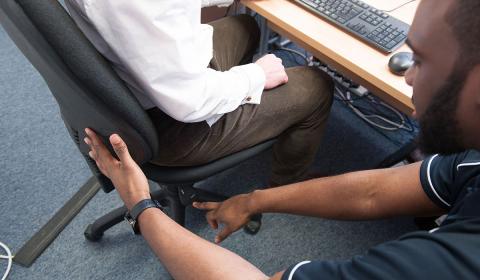Work-relevant upper limb disorders, such as RSI, are a leading cause of work-related ill health. They can impact on all forms of industry.

The good news is that most work-related illness or injury can be avoided if staff and employers put health concerns at the top of their ‘to do’ lists.
Office workers
- A change can be as good as a rest – vary your tasks, stand up to take a phone call, move around every 20 minutes or so
- Move your neck, arms and shoulders periodically while seated at your desk
- Sit facing straight ahead, feet flat on the floor (or on a sturdy footrest) and with legs uncrossed
- Adjust your chair and screen to find the most comfortable position for your work. As a broad guide, your forearms should be approximately horizontal and your eyes the same height as the top of the screen
- Adjust the backrest of your chair so that you can lean back against it comfortably. Make sure your lower back is supported
- Place your mouse within easy reach and support your forearms on the desk. Keep your wrists in a relaxed, neutral position. Drive the mouse from your shoulder, not your wrist
- Don’t wedge your phone between your ear and your shoulder. Use a lightweight headset if necessary
- Use a copyholder if you work from documents
- Make sure that at breaks you leave your desk and walk around. At lunchtime try to go out of the office for a walk. This will relax your muscles, stretch your joints and get fresh air into your lungs helping you to work better in the afternoon.
Manual workers
- Make good use of any equipment designed to help you with strenuous tasks
- Try splitting loads into manageable sizes, so that you can move them more easily. Minimise the distance you need to carry items by using handling aids, such as a trolley or lift if possible
- Avoid prolonged or repetitive tasks. If on a production line, ask your supervisor if job rotation is possible, for example, so that you work on a different side or position on the line and use different muscles
- Use both hands – pick one item with your left hand then one with your right
- Don’t over stretch to perform a task – move closer
- Avoid adopting a stooped or flexed posture when working at a bench or table by adjusting its height so that it is level with your waist
- Make sure your clothes fit well so you can move freely and keep warm – cold muscles don’t extend properly
- Check machinery regularly. If your equipment works well, it will save you from putting in extra physical effort or improvising technique
- Take more short breaks rather than one long one – use the time to stretch your arms and legs.
The most important thing you can do to prevent work relevant musculoskeletal disorders is to maintain a good level of physical fitness. Aim to do 30 minutes of exercise outside work at least five days out of seven.


